All Categories
Featured
Table of Contents

Routine eye examinations are essential for maintaining great vision and detecting possible eye health and wellness problems early. Nevertheless, the frequency of these tests can differ dramatically based upon an individual's age, lifestyle, and total wellness. Understanding the recommended routine for eye tests can help make certain that people of all ages obtain ideal treatment and tracking for their eye health and wellness.
Newborns and Toddlers (0-2 Years)
For young children and babies, eye examinations are vital for spotting any prospective vision troubles early on. The American Academy of Ophthalmology suggests that a kid's initial eye examination need to happen at around six months old. Throughout this first check out, the eye treatment specialist will certainly examine the child's visual growth and check for any type of apparent eye problems.Following this first examination, it is suggested that children have an additional eye exam at age three. This browse through will certainly concentrate on assessing the youngster's general aesthetic feature, including eye positioning and the capability to track objects. If no problems are found, the following examination must be scheduled before the kid starts college, typically around age 5 or six.
School-Aged Youngsters (6-18 Years)
Routine eye examinations must be scheduled every one to two years as soon as children reach college age. Vision is important for learning and development, and numerous colleges perform vision testings. These screenings do not change a detailed eye test by an eye treatment expert.For kids involved in sports or activities needing significant visual focus, yearly eye examinations may be suggested. Furthermore, if a youngster exhibits indications of vision issues-- such as difficulty checking out, squinting, or regular headaches-- a visit to the eye physician should be set up immediately.
Youthful Grownups (19-39 Years)
Young person commonly have less vision changes than older age, yet routine eye exams continue to be necessary. The basic referral is to set up an eye exam every two years throughout this duration. However, people with particular threat variables-- such as a household history of eye illness, diabetes mellitus, or those who put on contact lenses-- ought to consider yearly eye tests.In addition, those who invest significant time on electronic devices may experience electronic eye strain. If signs such as dry skin, tiredness, or obscured vision happen, it may be wise to see an eye care professional faster.
Grownups (40-64 Years)
As people enter midlife, the likelihood of creating vision troubles increases. Adults aged 40 to 64 must set up eye examinations every one to two years. This age group may begin to experience presbyopia, an all-natural age-related condition that makes it testing to focus on close things. Eye examinations can also help identify various other typical age-related conditions such as glaucoma, cataracts, and macular deterioration.If people in this age have risk variables such as hypertension or diabetes mellitus, they might require even more constant examinations to check their eye health carefully.
Elders (65 Years and Older)
For seniors, routine eye tests come to be even much more critical. The American Optometric Organization suggests that people matured 65 and older have an eye examination at least once a year.Conclusion.
Understanding the proper timetable for eye tests based on age is important for preserving ideal eye health throughout life. From infants to elders, regular eye examinations play an essential function in spotting problems early and guaranteeing that vision remains sharp. By sticking to these standards and talking to an eye treatment specialist, individuals can take proactive actions towards maintaining their vision and overall health and wellness. Whether it's a kid's first visit or an elderly's annual check-up, prioritizing eye treatment is a financial investment in long-lasting health.Latest Posts
The Boogaloo Sports Bar & Grill at FunCity Resort Resort: Where Enjoyable Fulfills Taste
Published Feb 12, 25
2 min read
Furnishings Styles Living Area
Published Jan 18, 25
0 min read
How to Keep Your Fence in Great Shape: Protecting Your Investment
Published Nov 29, 24
1 min read